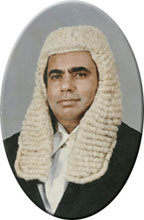Laws delays can cause increase in crime - AG
Sarath MALALASEKERA
“It is no exaggeration to state that the Criminal Law in Sri Lanka is
weighted more in favour of the accused than the prosecution. When a
prosecutor strides into a criminal court with the sole view of proving
his case, the dice is heavily loaded against him,” said Attorney
General, President’s Counsel C. R. de Silva at the Annual General
Meeting of The Asia Crime Prevention Foundation (ACPF) held at the Galle
Face Hotel on Saturday.
Addressing on non-summary inquiries, the Attorney General said that
“it is true that the increasing rate of crimes is also due to laws
delays. What happens today is that if a trial is taken up today further
trial is taken up six months later.
|

Attorney General, President’s Counsel C.R. de Silva. |
This is undesirable as far as the speedy administration of Justice.
There must be a structural arrangement to over come this problem. Non -
summary inquiries are another example of laws delays.
The Attorney General speaking as Chief Guest at the AGM on the theme
“Has the Criminal Justice System Served its Purpose” said that the
rising incidence of crime is a concomitant of some structural drawbacks
which prevail in our criminal justice system.
Speaking on ‘Burden of proof’, the Attorney General said what is in
effect burden of proof ? Though this term is used in indifferent senses,
in one sense it is the obligation of a party to establish his case
depending on whether it is civil or criminal.
As far as we are concerned, the term “burden of proof” means the
overall burden or the legal burden that is incumbent upon the
prosecution.
The famous case of ‘Woolmington’ established what is known today as
the golden thread principle. It states that the prosecution must
establish the guilt of the accused beyond reasonable doubt. But our
evidence ordinance places the legal burden in certain matters on the
accused.
“My contention is that in view of the limited instances in which the
burden is cast on the accused, the prosecution has suffered
immeasurably,” the Attorney General said.
Speaking on “Dock statements” the AG said dock statements have
features that hamper our prosecutions. I propose that they be repealed
and abrogated from our law.
In England there was a time when the accused were prohibited from
giving evidence because they were so indigent that they did not have the
wherewithal to retain counsel they virtually damaged their case and as a
result the English Law prohibited them from giving evidence.
Instead English Law conferred on them the right to make a dock
statement. This is the genesis of dock statements in England. We too
imported dock statements into our law from England.
The right to make dock statement was abolished in England by Section
72 of Criminal Justice Act 1982. Though the country of its birth has
abolished this right, dock statement continues to flourish in Sri Lanka.
The accused enjoys a number of advantages through a dock statement,
He cannot be cross-examined, he can freely attack prosecution witnesses
and he can incriminate a co-accused, the Attorney General said.
Speaking on ‘Confessions’ the Attorney General said confessions are
admitted as exceptions to the hearsay rule. Section 25 provided that no
confession made to police officer is admissible against the accused.
Take the case of an accused who happens to meet a police officer just
after committing a crime.
The accused makes a confession to this police officer who is totally
unconnected to the crime. This evidence cannot be utilised because of
this embargo on confessions to police officers. Sometimes police
officers produce suspects to a doctor.
The doctor might send the police officer out and interview the
accused in closed chambers. On inquiries made by the doctor the suspect
may come out with a confession.
“Why should not this evidence be permitted to be led,” asked the
Attorney General and said in evaluating the undesirability of excluding
confessions, it is incumbent on the prosecution to exclude the
appearance of inducement, threat or promise. Why can’t the prosecution
be allowed to use this confession made to a doctor if the prosecution
excludes the appearance of inducement, threat or promise.
Speaking on “Alibi” the Attorney General emphasised that the defence
of alibi, (i.e.) the accused was not there at the scene is relevant
because of Section 11 of the Evidence Ordinance. Whose burden is it to
prove alibi? Under Section 103 of the Evidence Ordinance the burden
should lie on the accused to prove alibi. Unfortunately, recent cases
have reiterated the position that there is no burden on the accused to
prove alibi.
The Court of Appeal held that if the trial Judge imposed a burden on
the accused it is a misdirection. Then what happens to the salutary
principle contained in Section 103 of the Evidence Ordinance? Ratnalal
in his commentary on Section 103 of the Indian Evidence Act has stated
that alibi must be proved by the accused. One wonders whether our law
permits two standards for alibi. Only legislature can clarify this
inconsistency, the Attorney General added.
In conclusion the Attorney General said that the laws of the country
as they stand today are not quite adequate to deal with the rise in
crime. But I would leave you with these thoughts so that you could
ponder over their utility value.
|

